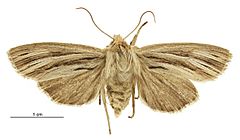Tmetolophota stulta facts for kids
Quick facts for kids Tmetolophota stulta |
|
|---|---|
 |
|
| Female | |
| Scientific classification | |
| Kingdom: | |
| Phylum: | |
| Class: | |
| Order: | |
| Family: | |
| Genus: |
Tmetolophota
|
| Species: |
T. stulta
|
| Binomial name | |
| Tmetolophota stulta (Philpott, 1905)
|
|
| Synonyms | |
|
|
The Tmetolophota stulta is a type of moth that lives only in New Zealand. It belongs to a big family of moths called Noctuidae, which are often known as "owlet moths." This moth is quite special because it's found nowhere else in the world!
Contents
What is the Tmetolophota Stulta Moth?
The Tmetolophota stulta is a small, winged insect. Like all moths, it goes through a complete metamorphosis. This means it starts as an egg, hatches into a larva (a caterpillar), then becomes a pupa, and finally transforms into an adult moth. As an adult, its main job is to reproduce.
Where Does This Moth Live?
This particular moth is endemic to New Zealand. This means it naturally lives only in New Zealand and nowhere else on Earth. New Zealand is famous for its unique plants and animals, and the Tmetolophota stulta is one of them. It has adapted perfectly to its home environment there.
Who Discovered This Moth?
The Tmetolophota stulta moth was first officially described in 1905. A scientist named Aldred Philpott was the person who studied it and gave it its scientific name. Scientists give new species names so they can be identified and studied by everyone around the world.
How Scientists Classify Moths
Scientists group living things into categories. This helps them understand how different species are related. The Tmetolophota stulta belongs to the family Noctuidae. This family includes many different types of moths, often called "owlet moths."
In 2019, a scientist named Robert J. B. Hoare did a big study of New Zealand's owlet moths. He looked closely at the original samples of the Tmetolophota stulta. After his research, he decided that this moth actually fit better into a different group, or genus, called Ichneutica. So, sometimes you might see it referred to as Ichneutica stulta as well. This shows how science is always learning new things!

